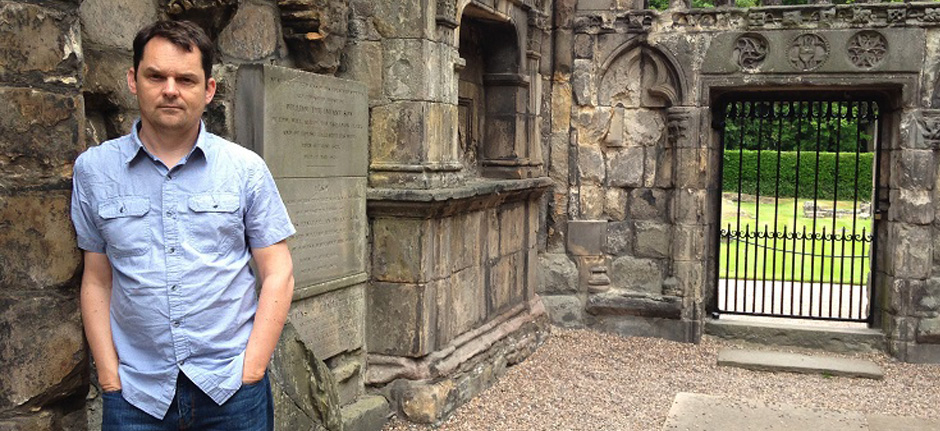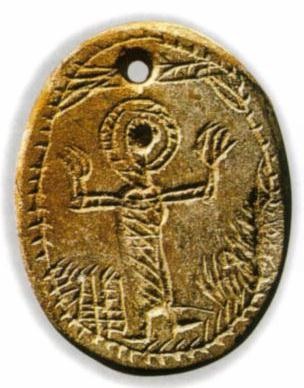Image: A Byzantine Gnostic amulet.
York University, Fall 2019
Instructor: Dr. Tony Burke
E-mail: tburke@yorku.ca
Phone: (416) 736-2100 ext. 33712
Time and Location: Wednesday 7-10 pm, DB 0009
Office Hours: Mon and Wed 5-6 pm (or by appointment), 247 Vanier College
1. Course Description
An introduction to Gnosticism, a second century religious movement that intersected and overlapped with Christianity and Judaism. Emphasis will be on readings of primary sources. The course objective are to acquaint students with the theories behind the origins and nature of Gnosticism, examine gnostic literature from ancient Christian, Jewish, and “pagan” sources, note the continuation of gnostic thought in later gnostic movements of the Medieval period and the Middle Ages, and consider elements of gnostic thought that exist today. Gnosticism has been characterized as “utterly incomprehensible”; it is my hope that, together, students and instructor can find some order in the chaos of gnostic literature and feel some empathy for the gnostic view of the world and humanity’s place within it. Students will learn advanced text-critical skills and become acquainted with scholarship in the field.
2. Required Texts
Nicola Denzey Lewis, Introduction to “Gnosticism”: Ancient Voices, Christian Worlds. London and New York: Oxford University Press, 2013.
Marvin Meyer (ed.), The Nag Hammadi Scriptures: The International Edition. San Francisco: Harper Collins, 2007.
Michael Williams, Rethinking “Gnosticism”: An Argument for Dismantling a Dubious Category. Princeton, NJ: Princeton University Press, 1996. PDF
3. Methods of Assessment
All written work in this course is expected to be of high quality—i.e., it must conform to the style and format guidelines typical of Humanities courses—and it must be your own. To help ensure that these requirements are met, you are urged to consult the resources on SPARK. In addition, a style sheet of my own design is to be attached to your assignments (see the assignment descriptions below). No paper will be accepted without the style sheet attached. For additional writing assistance, visit the Writing Centre.
NOTE: All graded work in this course is to be submitted to Turnitin.com (and brought to class in a hard copy). For an overview of this service and the University’s policies regarding Turnitin.com, please see HERE: It is very simple to use. Go to www.turnitin.com for instructions on how to create a user profile. You can use whatever email address you wish but it must be a working one since you will receive emails over the course of the year. It is recommended that you NOT use internet email accounts (e.g., Hotmail, Yahoo, etc.). You create your own password, so make it easy to remember. You will also require the following information to sign in initially: Class ID: 22199327. Password: gnosis.
4. Academic Integrity: York University is very concerned about the increase in student plagiarism. As heinous a crime as plagiarism is, sometimes it is perpetrated in ignorance. Please consult the SPARK page on academic integrity to learn more about it and about the repercussions of committing plagiarism.
5. Methods of Evaluation
A. Text Analyses: students will select four out of six texts assigned in the weekly readings (indicated on the syllabus), hand in a brief analysis of each and contribute heavily to the class in which the texts are to be discussed. Ask of the text: in what way is it, or is it not, “Gnostic”? what do you find interesting about it? what does it tell us about the community/author behind it? Please follow the guidelines of this Essay Writing Checklist and attach a copy (with boxes checked) to your papers. Length: 2 pages. Grade value: 10% each. Due: the class in which the individual texts are discussed (no exceptions).
B. Rethinking the Origins of the Nag Hammadi Library Assignment: the story of the discovery of the Nag Hammadi Codices has recently come under scrutiny by several scholars. Their arguments have potentially devastating implications for understanding the origins of the corpus. Read the following articles:
Denzey Lewis, Nicola, and Justine Ariel Blount. “Rethinking the Origins of the Nag Hammadi Codices.” JBL 133.2 (2014): 399–419 (PDF).
Goodacre, Mark. “How Reliable is the Story of the Nag Hammadi Discovery?” JSNT 35.4 (2013): 303–22 (PDF).
Your assignment is to summarize the two articles and then analyze their conclusions based on the following guiding questions: why does it matter where and by whom the codices were found? how does Lewis and Blount’s theory of origins affect our understanding of the codices? going forward, how should scholars evaluate accounts of how and where manuscripts were found? Please follow the guidelines of this Essay Writing Checklist and attach a copy (with boxes checked) to your paper. Length: 5 pages. Grade value: 20%. Due: Oct. 2.
C. Rethinking “Gnosticism” Analysis: toward the end of the course students will hand in an analysis of Michael Williams, Rethinking “Gnosticism” with the aim of assessing the cogency of his argument for dismantling “Gnosticism” as a category. The analyses will be discussed in the final class of the course. Caution: this assignment is not a book review, so a summary of the book is not required. Instead, assume your reader has the same knowledge of the book as you. Since this paper is an analysis, you should arrange your ideas thematically (making arguments about Williams’ thesis and presentation) not chronologically, as in a book review. Please follow the guidelines of this Essay Writing Checklist and attach a copy (with boxes checked) to your paper. Length: 7 pages. Value: 30%. Due: Nov. 27.
D. Class Participation: to encourage an optimum of instructor/student interaction, a portion of your final grade is allocated to class participation. The grade is based on class attendance and on asking/answering questions. Grade value: 10%.
Missing papers: In the event that papers go missing, it is your responsibility to keep a hard copy of all written work submitted for the course.
Late papers: the instructor, like you, is a very busy person. He likes to receive papers on time so that he can give them back to you within a reasonable time and then get on with other things he has to do (the instructor has other courses to teach and other papers to grade). Late papers complicate his life. So, he cannot accept late papers unless they are accompanied with documentation from Special Needs or Health Services. Contact the professor if you foresee problems handing in papers on time.
4. Important Dates
Sept. 17: Last date to enroll without permission of instructor
Oct. 1: Last date to enroll with permission of instructor
Nov. 8: Last date to drop course without receiving a grade
5. Class Schedule
Please come to class having read the assigned primary and secondary readings and having consulted the on-line resources. A lecture outline for each week’s class will be posted on-line by Monday evening. It is your responsibility to print your own copy of the outline and bring it to class.
Sept. 4: Introduction to the Course
On-line Resources: for a quick overview of the essentials of Gnosticism watch this episode of the Religion for Breakfast podcast: https://www.youtube.com/watch?v=Iuvk2bLCzwM
New to the study of early Christianity, or need your memory refreshed? Watch this video from Crash Course World History on Christianity from Judaism to Constantine.
Sept. 11: The Nag Hammadi Library
LECTURE OUTLINE
Read for Today: Denzey Lewis ch. 1
Online Resources: Watch James Robinson discuss the discovery of the Nag Hammadi Library in this short video: https://www.youtube.com/watch?v=y9x50KmhuG0
Sept. 18: Heresy Hunting
LECTURE OUTLINE
Read for Today: Denzey Lewis ch. 2; Irenaeus, Against Heresies (PDF 1, PDF 2); Epiphanius of Salamis, Against Heresies 33.3.1-33.7.10 (=Ptolemy’s Epistle to Flora) (PDF); Acts 8:9-25 (from the Bible).
Online Resources: watch David Litwa (Institute for Religion and Critical Inquiry) discuss the heresy hunters in this episode of the Talk Gnosis podcast: https://www.youtube.com/watch?v=P-LULoW-IyI
**Ptolemy’s Epistle to Flora analysis due today, if you chose that text **
Sept. 25: Religious Landscapes
LECTURE OUTLINE
Read for Today: Denzey Lewis ch. 3; Martin, Myths of the Ancient Greeks (PDF); Plato, excerpts from The Republic (PDF) and Timaeus (PDF); Plotinus, Enneads (PDF); Denzey Lewis ch. 4; Genesis 1-9; Mark 1; Acts 9:1-31; John 1; 1 Corinthians 1-3, 8-9, 12; 2 Corinthians 10-12; Colossians 2; 1 Timothy; 1 John (from the Bible).
Online Resources: is the Bible more gnostic than it appears? Read these two articles from the Gnostic Wisdom Network on Changes Made to the Bible to Make it Less Gnostic (part 1; part 2).
Oct. 2: Valentinians
LECTURE OUTLINE
Read for Today: Denzey Lewis ch. 5-8; Prayer of the Apostle Paul; Tripartite Tractate; Gospel of Truth; Gospel of Philip (all in Meyer).
Online Resources: the Gnosis Society hosts a home page dedicated to Valentinus. You can visit it at http://www.gnosis.org/library/valentinus/.
** Rethinking the Origins of the Nag Hammadi Library assignment due today **
Oct. 9: Thomas Christianity
LECTURE OUTLINE
Read for Today: Denzey Lewis ch. 9; Meyer, pp. 779-783; Gospel of Thomas; Book of Thomas.
On-line Resources: scholars Elaine Pagels and Helmut Koester discuss the significance of the Gospel of Thomas at http://www.pbs.org/wgbh/pages/frontline/shows/religion/story/thomas.html. Also, listen to NT scholar Mark Goodacre discuss the Gospel of Thomas in one of his podcasts.
**Gospel of Thomas analysis due today, if you chose that text **
Oct. 16: Reading Week ~ No class
Oct. 23: Sethian Gnosticism
LECTURE OUTLINE
Read for Today: Denzey Lewis ch. 10-12; Meyer, pp. 784-789; Three Steles of Seth; Secret Book According to John.
Online Resources: Christian theologians are not particularly happy with the modern interest in Gnosticism. For a “defense” of the faith against Gnosticism read this article on Gnostic Gospels on the Faith Defenders web site.
**Secret Book of John analysis due today, if you chose that text **
Oct. 30: Liturgy, Death, and the Divine Feminine
LECTURE OUTLINE
Read for Today: Denzey Lewis ch. 13-15; Holy Book of the Great Invisible Spirit (aka Gospel of the Egyptians); Treatise on the the Resurrection; 1 Apocalypse of James; Thunder: Perfect Mind.
Online Resources: Many have attempted to set Thunder: Perfect Mind to music. For a <ahem> interesting take on the enterprise see this video by Catherine Braslavsky and Joseph Rowe: https://www.youtube.com/watch?v=SFhD82z7aJQ
**Thunder: Perfect Mind analysis due today, if you chose that text **
Nov. 6: Gnostic Apocalypses
LECTURE OUTLINE
Read for Today: Denzey Lewis ch. 17-19; Letter of Peter to Philip; Apocalypse of Peter; Apocalypse of Adam; Apocalypse of Paul.
On-line Resources: as a lead-in to our upcoming Gnosticism at the Movies event, read this introduction to Eric Wilson’s book Secret Cinema: Gnostic Visions in Film. And check out this list of Gnostic Movies and Movies with Gnostic Ideas.
**Apocalypse of Adam analysis due today, if you chose that text **
Nov. 13: Corpus Hermeticum; Mandaeans and Manichaeans
LECTURE OUTLINE
Read for Today: Denzey Lewis ch. 16; Meyer pp. 795-798; Discourse on the Eighth and Ninth; Excerpt from the Perfect Discourse; The Cologne Mani Codex (PDF) (photographs of the Codex are available HERE)
On-line Resources: watch Timothy Pettipiece (Carleton University) discuss Manichaeans on the Talk Gnosis podcast: https://youtu.be/_5CUUsDovtM
Nov. 20: The Gospel of Judas and the Gospel of Mary
LECTURE OUTLINE
Read for Today: Denzey Lewis ch. 20; Gospel of Judas; Gospel of Mary.
Online Resources: watch Bart Ehrman’s (University of North Carolina at Chapel Hill) lecture on the Gospel of Judas, filmed shortly after it was published in 2008: https://www.youtube.com/watch?v=qIXwSjyxe88
** Gospel of Judas analysis due today, if you chose that text **
Nov. 27: Modern Gnosticism and Redefining Gnosticism
LECTURE OUTLINE
Read for Today: Richard Smith, “The Modern Relevance of Gnosticism” (PDF).
On-line Resources: David Brakke (Ohio State University) talks about redefining Gnosticism in this interview with Frank Zindler: https://www.youtube.com/watch?v=hqGTsbu_roI
** Rethinking Gnosticism analysis due today **

